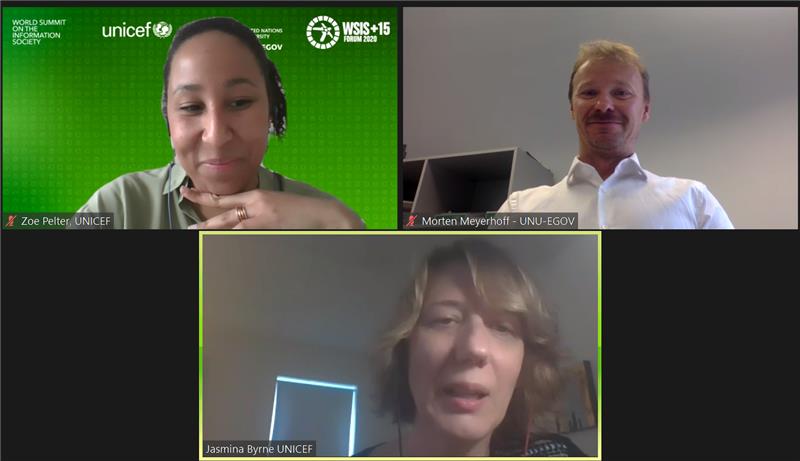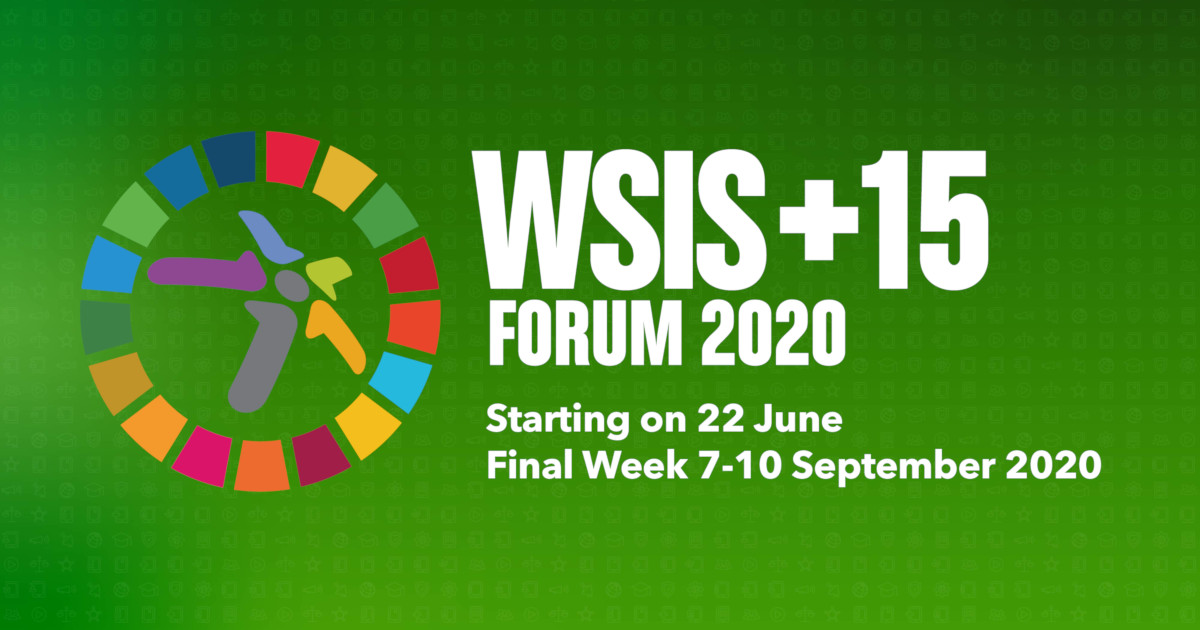Children and the digital transformation of public services: Identifying trends
UNICEF and UNU-EGOV
Session 223
The COVID-19 pandemic shines a light on the vital role of digital health, education, and social public services for inclusive and responsive governance today. However, it also highlights existing local and global digital divides and the challenges of delivering digital services. Amidst the rapid rollout of online education, information and service platforms during the pandemic, it is clear that little is understood about the opportunities and challenges of digital public services for children, even in countries well into their digital transformation. If we are to achieve the Sustainable Development Goals and ensure that no one is left behind, it is essential to understand the impact of the digital transformation of society on children.
UNICEF and UNU-EGOV are jointly organising a workshop on children and the digital transformation of public services, which will be held as part of WSIS Forum 2020. During the session, UNU and UNICEF specialists will present the results of research and interviews undertaken as part of an exploratory study on digital services and children. All participants will be actively encouraged to ask questions and provide feedback on the findings, and inputs from the session will be used in upcoming policy recommendations.
Topics: Digital Inclusion, Children, Age, Gender, Public Services, Impact, Policy Recommendations, Digital Transformation, Sustainable Development Goals etc.
Agenda:
- 0-09 min Welcome, motivation and objectives (Jasmina Byrne, Chief of Policy, Global Insight, UNICEF)
- 10-19 min State-of-affairs (Morten Meyerhoff Nielsen, EGOV Adviser, UNU-EGOV)
- 20-29 min Case studies (Zoë Pelter, Global Insight, UNICEF)
- 30-54 min Moderated discussion with participants (moderated by Jasmina, contributions by Zoë, Morten and Mercy Makpor)
- 55-60 min Summary of discussions and next steps (Jasmina)
Audience: International Audience. Representatives from public administrations, public bodies and public agencies, non-governmental.
Language: English
Methodology: Mixed method with short presentation, Q&A and active engagement on key questions. This session will be recorded.
Workshop collaborators:

Jasmina Byrne is Chief of Policy at UNICEF’s Office of Global Insight and Policy, where she oversees frontier policy portfolios for the organization ranging from digital technology to governance and the environment. Jasmina leads the Office’s flagship initiative towards a data governance for children manifesto. Prior to this, she led UNICEF Office of Research (Innocenti) work on children’s rights in the digital age, co-leading the Global Kids Online research initiative.

Morten Meyerhoff Nielsen is an EGOV Adviser at the United Nations University - EGOV, an international think tank working with the digital transformation of the public sector.
He is responsible for digital transformation projects on performance management, strategy, and capacity development Georgia, Uganda, and Saudi Arabia. He leads projects with UNICEF and the Digital Future Society on the impact of the digital transformation of service delivery on both marginalized communities, children, and women.
Morten regularly run executive training on digital transformation of the public sector and is a guest lecturer at several European universities.
Past employment includes the Danish Agency for Digitisation, Danish Technological Institute, European Institute of Public Administration, Centre for the Development of Enterprise; European Commission, and University of KwaZulu-Natal.
Morten is currently completing his ph.d. at Tallinn University of Technology. He is an author and co-author of various publications, a reviewer for various journals, on multiple conference committees, and a juror on several awards committees.
.jpg)
Zoë Pelter is a Policy Officer with UNICEF’s Office of Global Insight and Policy, where she works across a number of frontier policy portfolios including governance and society. Most recently, Zoë’s work has focused on digital civic engagement trends amongst young people, and innovations in governance and policymaking. Prior to her role with UNICEF, Zoë worked as a development policy and local governance analyst for UNDP in Pakistan.

Mercy Erhi Makpor is currently a Research Assistant at the United Nations University Operating Unit on Policy-Driven Electronic Governance. She is also a Research Associate and prospective PostDoc Candidate in the School of Economics and Management, University of Minho, Portugal.
Her research area is in e-Governance with a keen interest in Digital Inclusion and Gender Equality. She is also interested in Ethics and Corporate Social Responsibility with specificity to the supply chain mapping, third party relationships, stakeholder engagements, and effective CSR integration in the Oil and Gas sector. Her other interest is in the area of human development at micro and macro levels where she focuses on individual and institutional responses to social, economic and environmental issues with the possibility of reaching and sustaining mutual grounds for human growth and development. She has also researched Gender advocacy and Sexual Reproductive Health and Rights. She takes great interest in counselling, programme facilitation, leadership and team-building practices.
She has had years of experience conducting research and working with professionals from some of the biggest research teams in Canada under the Teasdale-Corti Team Grant, a host of others from Europe under the European Commission and currently with the United Nations University.
-
 C1. The role of governments and all stakeholders in the promotion of ICTs for development
C1. The role of governments and all stakeholders in the promotion of ICTs for development
-
 C2. Information and communication infrastructure
C2. Information and communication infrastructure
-
 C3. Access to information and knowledge
C3. Access to information and knowledge
-
 C11. International and regional cooperation
C11. International and regional cooperation
Digital inclusion is a precondition not address current global challenges but for a successful transition of society in the 4th industrial revolution. Children are both directly and indirectly impacted by this. Building on the guiding principle of the SDGs of “leaving no one behind”, the need to address the digital divide, the impact of the digital transformation of service delivery has a direct impact on children, their parents, and guardians and is, therefore, a factor in all 17 SGDs and WSIS Action Lines in some way.
-
 Goal 1: End poverty in all its forms everywhere
Goal 1: End poverty in all its forms everywhere
-
 Goal 17: Revitalize the global partnership for sustainable development
Goal 17: Revitalize the global partnership for sustainable development
Digital inclusion is a precondition not address current global challenges but for a successful transition of society in the 4th industrial revolution. Children are both directly and indirectly impacted by this. Building on the guiding principle of the SDGs of “leaving no one behind”, the need to address the digital divide, the impact of the digital transformation of service delivery has a direct impact on children, their parents, and guardians and is, therefore, a factor in all 17 SGDs in some way.
.jpg)


